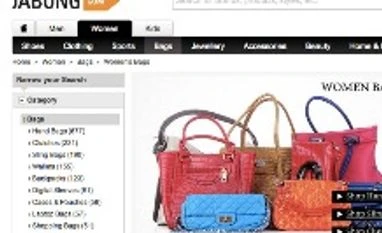Next time you decide to buy unique bags from Rajasthan’s artisans or specially-designed sarees from Surat, you could do so with the click of a mouse, thanks to India’s e-commerce boom. Leading fashion portals like Jabong and Myntra are tying up with boutiques or labels that source handicrafts.
Jabong has joined hands with 10 boutiques, such as Meo Home Craft (for bags by rural artisans from Tijara, Rajasthan), Rinku Sobti (womenswear), Nidhi Munim, Crazy Palette (clutches & bags) and Uttama Bhatt (ethnic womenswear). Myntra has tied up with women’s ethnicwear brands like Gujarat’s Florence and Bansi.
Such fashion portals already have tie-ups with high-end designers like Ritu Kumar and Sabyasachi. Their association with rural artisans will let the latter partake of the growth story that is online fashion.
Jabong has named its initiative as ‘Jabong Boutiques’, which will act as a platform for small and medium entrepreneurs to connect with customers across the country. “The objective is to empower designers with capabilities to craft haute couture and ready-to-wear ethnic and western apparel that are edgy but not runwayesque,” says Jabong founder Praveen Sinha.
Jabong is working with a team of designers who are ex-Zara, River Island and Mango on its private labels. Myntra, too, has already launched Myntra Fashion Incubator to nurture upcoming designers.
According to Sinha, Jabong expects 5 per cent of revenue in 2015-16 from Jabong Boutiques. It reported a gross merchandise value of Rs 509 crore from 3.1 million orders in January-June, 2014.
“The Indian fashion market is fragmented, both in demand and supply. The fragmentation in womenswear is higher than menswear. But the response from shoppers is very encouraging,” Subramanian adds.
A study by retail consultant Technopak predicts India’s e-tailing market will reach the size of $32 billion by 2020, from $2.3 billion this year. India’s apparel retail will grow to nearly 2.5 times its current size ($41 billion in 2013) by 2023.
Jabong has joined hands with 10 boutiques, such as Meo Home Craft (for bags by rural artisans from Tijara, Rajasthan), Rinku Sobti (womenswear), Nidhi Munim, Crazy Palette (clutches & bags) and Uttama Bhatt (ethnic womenswear). Myntra has tied up with women’s ethnicwear brands like Gujarat’s Florence and Bansi.
Such fashion portals already have tie-ups with high-end designers like Ritu Kumar and Sabyasachi. Their association with rural artisans will let the latter partake of the growth story that is online fashion.
More From This Section
Myntra COO Ganesh Subramanian says, “There is an opportunity for small entrepreneurs and manufacturers to create big brands with the help of e-commerce. We are seeing quite a few labels from entrepreneurs and manufacturers are performing well and slowly reaching the scale of more established brands.”
Jabong has named its initiative as ‘Jabong Boutiques’, which will act as a platform for small and medium entrepreneurs to connect with customers across the country. “The objective is to empower designers with capabilities to craft haute couture and ready-to-wear ethnic and western apparel that are edgy but not runwayesque,” says Jabong founder Praveen Sinha.
Jabong is working with a team of designers who are ex-Zara, River Island and Mango on its private labels. Myntra, too, has already launched Myntra Fashion Incubator to nurture upcoming designers.
According to Sinha, Jabong expects 5 per cent of revenue in 2015-16 from Jabong Boutiques. It reported a gross merchandise value of Rs 509 crore from 3.1 million orders in January-June, 2014.
“The Indian fashion market is fragmented, both in demand and supply. The fragmentation in womenswear is higher than menswear. But the response from shoppers is very encouraging,” Subramanian adds.
A study by retail consultant Technopak predicts India’s e-tailing market will reach the size of $32 billion by 2020, from $2.3 billion this year. India’s apparel retail will grow to nearly 2.5 times its current size ($41 billion in 2013) by 2023.
)